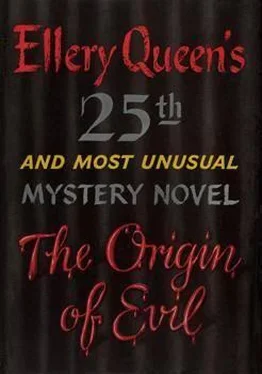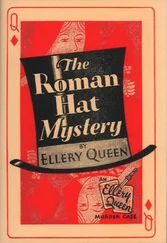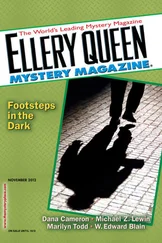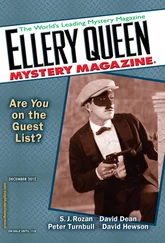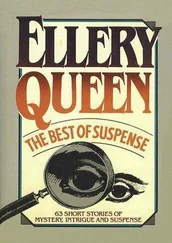“You go right ahead, Queen.’’
“Very kind of you, Mr. Priam. By the way, have you added any books since your catalogue was made up?”
“Added any?” Priam stared. “I got all the good ones. What would I want with more? When d’ye want to do it?”
“No time like the present, I always say, Mr. Priam. The night is killed, anyway.”
“Maybe tomorrow I’ll change my mind, hey?” Priam showed his teeth again in what he meant to be a friendly grin. “That’s all right, Queen. Shows you’re no dope, even if you do write books. Go to it!” The grin faded as he turned his animal eyes on Wallace. “You push me back, Alfred. And better bunk downstairs for the rest of the night.”
“Yes, Mr. Priam,” said Alfred Wallace.
“Delia, what are you standing around for? Go back to bed.”
“Yes, Roger.”
The last they saw of Priam he was waving amiably as Wallace wheeled him across the hall. From his gesture it was apparent that he had talked himself out of his fears, if indeed he had not entirely forgotten their cause.
When the door across the hall had closed, Ellery said: “I hope you don’t mind, Mrs. Priam. We’ve got to know which book this was.”
“You think Roger’s a fool, don’t you?”
“Why don’t you go to bed?”
“Don’t ever make that mistake. Crowe!” Her voice softened. “Where’ve you been, darling? I was beginning to worry. Did you find your grandfather?”
Young Macgowan filled the doorway; he was grinning. “You’ll never guess where.” He yanked, and old Collier appeared. There was a smudge of chemical stain along his nose and he was smiling happily. “Down in the cellar.”
“Cellar?”
“Gramp’s fixed himself up a dark room, Mother. Gone into photography.”
“I’ve been using your Contax all day, daughter. I hope you don’t mind. I’ve got a great deal to learn,” said Collier, shaking his head. “My pictures didn’t come out very well. Hello there! Crowe tells me there’s been more trouble.”
“Have you been in the cellar all this time, Mr. Collier?” asked Lieutenant Keats.
“Since after supper.”
“Didn’t you hear anything? Somebody jimmied that window.”
“That’s what my grandson told me. No, I didn’t hear anything, and if I had I’d probably have locked the cellar door and waited till it was all over! Daughter, you look all in. Don’t let this get you down.”
“I’ll survive, Father.”
“You come on up to bed. Good night, gentlemen.” The old man went away.
“Crowe.” Delia’s face set. “Mr. Queen and Lieutenant Keats are going to be working in the library for a while. I think perhaps you’d better stay... too.”
“Sure, sure,” said Mac. He stooped and kissed her. She went out without a glance at either of the older men. Macgowan shut the door after her. “What’s the matter?” he asked Ellery in a plaintive tone. “Don’t you two get along any more? What’s happened?”
“If you must keep an eye on us, Mac,” snapped Ellery, “do it from that chair in the corner, where you’ll be out of the way. Keats, let’s get going.”
The “Priam collection” was a bibliographic monstrosity, but Ellery was in a scientific, not an esthetic, mood and his methodology had nothing to do with art or even morals; he simply had the Hollywood detective read off the titles on Priam’s shelves and he checked them against the gold-crusted catalogue.
It took them the better part of two hours, during which Crowe Macgowan fell asleep in the leather chair.
When at last Keats stopped, Ellery said: “Hold it,” and he began to to thumb back along the pages of the catalogue.
“Well?” said Keats.
“You failed to read just one title.” Ellery set the catalogue down and picked up the charred corpse of the book. “This used to be an octavo volume bound in laminated oak, with handblocked silk endpapers, of The Birds, by Aristophanes.”
“The what, by whom?”
“The Birds. A play by Aristophanes, the great satirical dramatist of the fifth century before Christ.”
“I don’t see the joke.”
Ellery was silent.
“You mean to tell me,” demanded the detective, “that the burning of this book by a playwright dead a couple of dozen centuries is another of these warnings?”
“It must be.”
“How can it be?”
“Mutilated and burned, Keats. At least two of the four previous warnings also involved violence in some form: the food poisoning, the murder of the frogs...” Ellery sat up.
“What’s the matter?”
“Frogs. Another play by Aristophanes has that exact title. The Frogs.” Keats looked pained.
“But that’s almost certainly a coincidence. The other items wouldn’t begin to fit... The Birds. An unknown what’s-it, food poisoning, dead toads and frogs, an expensive wallet, and now a plushy edition of a Greek social satire first performed ― unless I’ve forgotten my Classics II ― in 414 b.c.”
“And I’m out of cigarets,” grunted Keats. Ellery tossed a pack over. “Thanks. You say there’s a connection?”
“ ‘And for each pace forward a warning... a warning of special meaning for you ― and for him,’ ” Ellery quoted. “That’s what the note said. ‘Meanings for pondering and puzzling.’ ”
“How right he was. I still say, Queen, if this stuff means anything at all, each one stands on its own tootsies.”
“ ‘For each pace forward,’ Keats. It’s going somewhere. No, they’re tied. The whole thing’s a progression.” Ellery shook his head. “I’m not even sure any more that Priam knows what they mean. This one tonight really balls things up. Priam is virtually an illiterate. How could he possibly know what’s meant by the destruction of an old Greek play?”
“What’s it about?”
“The play? Well... to the best of my recollection, two Athenians talk the Birds into building an aerial city, in order to separate the Gods from Man.”
“That helps.”
“What did Aristophanes call his city in the air? Cloud... Cloud-land... Cloud-Cuckoo-Land.”
“That’s the first thing I’ve heard in this case that rings the bell.” Keats got up in disgust and went to the window.
A long time passed. Keats stared out at the night, which was beginning to boil and show a froth. But the room was chilly, and he hunched his shoulders under the leather jacket. Young Macgowan snored innocently in the club chair. Ellery said nothing.
Ellery’s silence lasted for so long that after a time Keats, whose brain was empty and wretched, became conscious of its duration. He turned around tiredly and there was a gaunt, unshaven, wild-eyed refugee from a saner world staring back at him with uninvited joy, grudgingly delirious, like a girl contemplating her first kiss.
“What in the hell,” said the Hollywood detective in alarm, “is the matter with you?”
“Keats, they have something in common!”
“Sure. You’ve said that a dozen times.”
“Not one thing, but two.”
Keats came over and took another of Ellery’s cigarets. “What do you say we break this up? Go home, take a shower, and hit the hay.” Then he said, “What?”
“Two things in common, Keats!” Ellery swallowed. His mouth was parched and there was a tuneful fatigue in his head, but he knew he had it, he had it at last.
“You’ve got it?”
“I know what it means, Keats. I know.”
“What? What?”
But Ellery was not listening. He fumbled for a cigaret without looking.
Keats struck a match for him and then, absently, held it to his own cigaret; he went to the window again, inhaling, filling his lungs. The froth on the night had bubbled down, leaving a starchy mass, glimmering like soggy rice. Keats suddenly became aware of what he was doing. He looked startled, then desperate, then defiant. He smoked hungrily, waiting.
Читать дальше
